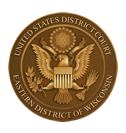Comments Due September 24, 2020
The Local Rules Committee recommends the creation of Local Rule 16.1 which corresponds to the federal criminal rule of the same number that became effective December 1, 2019. The rule sets forth a list of items to be discussed at the scheduling conference. Any comments should be submitted to Gina M. Colletti, Clerk of Court, via email at gina_colletti@wied.uscourts.gov by September 24, 2020.
Criminal L. R. 16.1. Pretrial Discovery Conferences.
(a) Timing. As soon after indictment as practicable, and in no event more than 14 days after arraignment, the attorney for the government and counsel for the defendant must confer regarding discovery. In cases in which a pretrial scheduling conference will be held pursuant to Criminal L. R. 12(a), the parties should confer sufficiently in advance of the conference to be able to provide meaningful information to the Court.
(b) Discussion topics. To facilitate efficient preparation for trial, the attorney for the government and counsel for the defendant should discuss the scope and timing of discovery. This discussion should include:
(1) the volume, format, and categories of electronically stored information (ESI) included in the discovery materials, and the extent to which such materials are being provided in a searchable format;
(2) whether the discovery materials include items or types of information that cannot be copied and instead will be made available for inspection upon request, such as contraband, tangible objects, or bulky materials;
(3) the extent to which the discovery materials include, or are anticipated to include, reports of examinations or tests covered by Rule 16(a)(1)(F) or summaries of intended expert testimony covered by Rule 16(a)(1)(G);
(4) whether a protective order would be appropriate given the nature of the case or content of the discovery materials;
(5) the extent to which the discovery will be redacted;
(6) the extent to which the defendant anticipates providing reciprocal discovery under Crim. L. R. 16;
(7) the expected timing of:
(a) the production of initial and any anticipated additional discovery by the government;
(b) the disclosure of identity information for any confidential informants who were transactional witnesses; and
(c) the disclosure of Giglio information for the government’s trial witnesses; and
(8) any other topics that could help the Court set an appropriate schedule for production of discovery, filing of motions, and preparation for trial.
(c) Request for Court Action. After the discovery conference, if good faith efforts have failed to result in agreement by all counsel, any party may ask the Court to determine or modify the time, place, manner, or any other aspect of disclosure to facilitate preparation for trial. To the extent a party is seeking to compel discovery or disclosure, the party must comply with Criminal L. R. 16(b).
Committee Comment: This rule implements Federal Rule of Criminal Procedure 16.1, which was adopted in 2019. Like the federal rule, the local rule describes a general procedure that the parties should adapt to the circumstances of the case. Because technology changes rapidly, neither the federal nor local rule sets forth specific requirements for the manner, timing, or format of disclosure in cases involving ESI. However, counsel should seek to be familiar with best practices and are encouraged to review the "Recommendations for Electronically Store Information (ESI) Discovery Production in Federal Criminal Cases" published jointly by the Department of Justice, the Administrative Office of the U.S. Courts, and the Joint Working Group on Electronic Technology in the Criminal Justice System (JETWG) in 2012.
